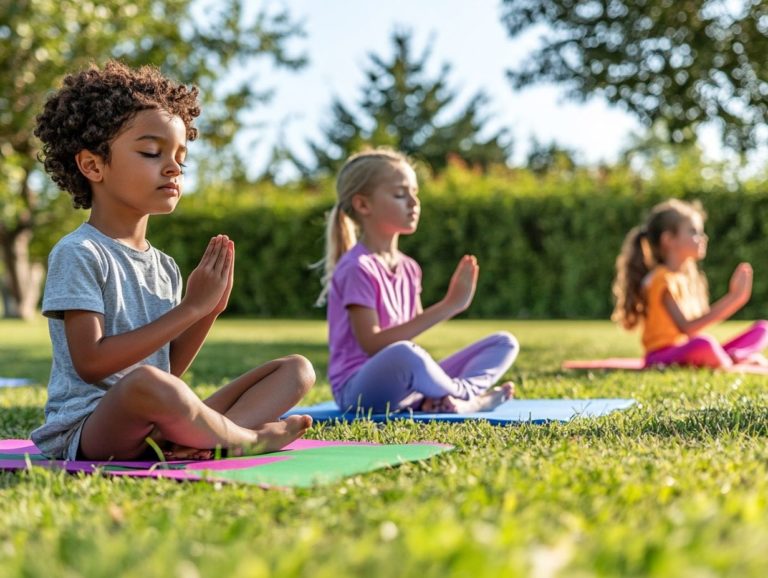10 Effective Mindfulness Techniques for Busy Parents
Contents
- Mindfulness Practices for Busy Parents
- Key Takeaways:
- 1. Practice Deep Breathing
- 2. Take Short Mindful Breaks Throughout the Day
- 3. Incorporate Mindful Movement into Daily Tasks
- 4. Create a Gratitude Practice
- 5. Practice Mindful Listening
- 6. Engage in Mindful Eating
- 7. Use Mindful Reminders
- 8. Connect with Nature
- 9. Practice Visualization and Positive Affirmations
- 10. Find Time for Self-Care
- What Is Mindfulness and How Can It Help Busy Parents?
- What Are the Benefits of Practicing Mindfulness?
- How Can Busy Parents Incorporate Mindfulness into Their Daily Routine?
- What Are Some Common Challenges in Practicing Mindfulness for Parents?
- Frequently Asked Questions
- Mindfulness for Busy Parents
Mindfulness Practices for Busy Parents
In today s fast-paced world, busy parents often find themselves juggling a myriad of responsibilities, leaving little room for self-care and personal well-being.
Mindfulness presents a compelling solution, offering simple yet powerful techniques that can help you navigate daily challenges with greater ease and presence. These practices can significantly aid in managing your feelings and reducing stress.
This article delves into ten effective mindfulness practices meticulously designed for parents ranging from deep breathing and mindful breaks to gratitude exercises and connecting with nature. These practices not only help with anxiety and stress but also promote a deeper awareness of the present moment.
Explore how these techniques can enrich your parenting journey and cultivate deeper, more meaningful relationships with your children. By engaging your senses and embracing positive self-talk, you can strengthen your emotional connections and enhance your family’s happiness.
Key Takeaways:

- Incorporate deep breathing into your daily routine for quick moments of calm and stress relief. Consider habit stacking these breathing exercises with your existing routines for better integration.
- Take short mindful breaks throughout the day to reset and refocus your mind. Utilize mindfulness apps to set reminders for these important breaks.
- Incorporate mindful movement into daily tasks, such as walking or doing household chores, to stay present and reduce stress. Mindful walking can help you engage your senses and feel more grounded.
1. Practice Deep Breathing
Practicing deep breathing is a fundamental mindfulness technique that enables you, as a busy parent, to manage stress and regulate your feelings. This allows you to embrace the present moment with a calm and focused mindset, which is essential for navigating the challenges of parenting.
By incorporating deep breathing exercises into your daily routine, you can create a space free of judgment that not only reduces stress but also fosters a deeper connection with your children, significantly enhancing family mental health and overall happiness.
Integrating various deep breathing techniques into your life can be both simple and effective. For instance, try the 4-7-8 method: inhale for four counts, hold your breath for seven, and then exhale for eight. This technique can easily fit into quiet moments like while waiting for school pickup or even during a brief escape to the bathroom for a moment of peace.
Another valuable exercise is box breathing, where you inhale, hold, exhale, and hold again for equal counts. This promotes a sense of balance that you ll appreciate. Just a few minutes each day devoted to these exercises boosts your emotional resilience and models healthy coping strategies for your children, creating a more harmonious home environment.
2. Take Short Mindful Breaks Throughout the Day
Short, mindful breaks can transform your day! They are an effective strategy for busy parents like you to reset your mental state, lighten your mental load, and enhance your emotional balance.
These breaks can easily fit into your daily routine. Just take a moment to savor the rich aroma of your morning coffee or engage in some deep breathing while the kettle boils.
For example, when you re washing dishes, focus entirely on the sensations the warmth of the water and the texture of the dishes transforming a mundane chore into a mindful experience. Alternatively, spend a few quiet minutes in your garden, letting the soothing sounds of nature wash over you and cultivate a sense of peace.
Incorporating a mindfulness jar filled with positive reminders can also help keep you grounded during these moments. These practices not only offer a much-needed mental reset but also help you stay emotionally present, paving the way for more meaningful interactions with your kids.
Start your mindfulness journey today, and notice the positive changes in your parenting and your family’s happiness! We encourage you to share your experiences or thoughts in the comments below.
3. Incorporate Mindful Movement into Daily Tasks
Incorporating mindful movement into your daily tasks not only enhances self-care but also addresses the challenges of parenting by becoming more aware of your body and surroundings. This creates exciting opportunities to be more engaged with your children!
Consider simple practices such as stretching during playtime or enjoying family yoga sessions that foster connection and relaxation. Taking a mindful walk in the park allows you to immerse yourself in your environment, truly noticing the sights, sounds, and textures that surround you. By doing so, you enhance your sensory processing and overall well-being.
By embracing these forms of movement, you can elevate your sense of well-being and carve out joyful moments amidst your busy schedule. Engaging your senses in these activities deepens your mindfulness experience. It transforms your routine into both a healthful practice and an opportunity for emotional bonding with your kids.
Mindful movement can also help you practice positive self-talk, further supporting your mental health.
4. Create a Gratitude Practice
Establishing a gratitude practice is a powerful way for busy parents to cultivate mindfulness, enhance emotional regulation, and shift your focus from stressors to positive experiences. Something as simple as maintaining a gratitude journal can significantly elevate your mental health and improve family dynamics. This practice can also help in managing anxiety and enhancing overall happiness.
In our busy lives, juggling work and family can feel overwhelming. Taking just a moment to express gratitude can be truly transformative. You can easily weave this practice into your daily routine by dedicating just a few minutes each evening. Whether you choose to jot down three things you re thankful for during dinner or reflect on joyful moments before bedtime, these small rituals can genuinely rewire your thinking.
Consider prompts like “What made me smile today?” or “Who in my life am I grateful for?” These serve as gentle reminders to focus on the positive aspects of your life. Research shows that this practice can lead to increased happiness, reduced feelings of depression, and improved relationships.
By fostering an atmosphere of gratitude at home, you not only nurture your own well-being but also model this invaluable trait for your children, creating a more empathetic and connected family environment.
5. Practice Mindful Listening
Practicing mindful listening is essential for you as a busy parent aiming to nurture strong relationships with your children. It enhances your emotional regulation and fosters a deeper understanding of their needs, creating a judgment-free environment that invites open communication.
By fully engaging in conversations, you can demonstrate your commitment to understanding your children’s perspectives. This means not just hearing their words but actively processing what they say. Techniques such as maintaining consistent eye contact and eliminating distractions like your mobile devices can help you achieve this.
When you show that you are present and genuinely invested in the conversation, it cultivates trust and signals to your children that their thoughts and feelings are valued. Over time, these mindful practices can lead to improved family dynamics, deepening emotional connections and allowing for healthier interactions that build stronger bonds.
6. Engage in Mindful Eating

Engaging in mindful eating presents you with a unique opportunity to reconnect with your food and your body. This transformation turns mealtimes into moments of self-care and stress relief.
This practice not only benefits you but also models healthy habits for your children, enhancing the overall wellness of your family. By focusing on the flavors, textures, and aromas of each bite, you cultivate a deeper appreciation for your meals.
This heightened awareness encourages healthier food choices and helps prevent mindless snacking. Mindful eating enriches your individual health while also playing a crucial role in managing your emotions, as sharing experiences and feelings around the table fosters stronger family bonds.
Implementing simple strategies, like eliminating distractions during mealtime, savoring slow sips of water, or discussing the origins of your food, can create a more dynamic and engaging atmosphere. These practices strengthen connections among family members, making every meal an enriching experience.
Mindful eating can also significantly contribute to stress reduction and emotional regulation.
7. Use Mindful Reminders
Utilizing mindful reminders, whether through mindfulness apps or simple notes placed strategically around your home, can significantly help you stay present amid the chaos of parenting challenges.
This approach fosters emotional regulation and encourages regular self-care practices. Mindfulness jars filled with positive affirmations can also serve as powerful reminders to stay grounded and present.
By weaving these reminders into your daily routine, you create touchpoints that prompt moments of reflection, grounding, and intentional breathing.
Simple techniques, like setting alarms on your smartphone or placing sticky notes in areas you frequent, can serve as cues to pause, take a breath, and reconnect with the present.
Mindfulness apps such as Headspace, Calm, or Insight Timer offer guided meditations and notifications designed to encourage moments of stillness throughout your day.
These tools assist in navigating the demands of parenting and contribute to cultivating a more balanced and centered emotional state. Incorporating these apps can be a critical part of your self-care toolkit.
8. Connect with Nature
Connecting with nature serves as a powerful mindfulness practice for busy parents. It enhances mental health while offering enriching experiences that strengthen family bonds and foster emotional regulation.
It invites you to appreciate the beauty of the present moment. Spending time in nature helps improve sensory processing and provides a natural setting for mindfulness and meditation practices.
Engaging in activities like family hikes or gardening allows you and your children to immerse yourselves in the natural world, free from the distractions of technology and daily stressors.
By exploring local trails or tending to a vegetable garden together, you can cultivate a deeper connection with your family while enjoying the refreshing mental health benefits of fresh air and physical activity, which is crucial for stress reduction.
Research shows that shared experiences in nature reduce anxiety and boost mood, making it essential for you to prioritize time outdoors.
Spending time in nature not only inspires curiosity and learning but also reinforces the idea that nurturing connections both with loved ones and the environment ultimately enriches your life and your children s childhood experiences.
Start today by planning a family hike this weekend and reconnect with nature!
9. Practice Visualization and Positive Affirmations
Practicing visualization and positive affirmations cultivates a positive mindset. This approach enhances your mindfulness practice by promoting self-care and emotional regulation, ultimately leading to a more fulfilling parenting experience.
By integrating these techniques into your daily routine, you can create a sanctuary of calm amidst the chaos of everyday life. For instance, taking just a few moments each morning to visualize a peaceful family interaction can set a positive tone for your day.
Reciting affirmations such as I am a patient and loving parent or I nurture my children with understanding and kindness reinforces those enabling beliefs.
These small yet impactful practices not only boost your mental health but also enhance your parenting skills, making it easier for you to navigate challenges with grace and resilience.
10. Find Time for Self-Care
As a busy parent, finding time for self-care is not just essential it s a game-changer! It allows you to recharge mentally and emotionally. Mindfulness becomes a crucial tool in handling the many challenges you face as a parent, ensuring that you maintain emotional regulation for both yourself and your children.
In the whirlwind of daily routines balancing work commitments, household chores, and your children s activities it s easy to overlook your own well-being amidst the mental load. However, by embracing simple self-care strategies, you can cultivate a healthy mindset that ultimately benefits your entire family.
Incorporating mindfulness practices such as deep breathing exercises or brief meditation sessions helps you center yourself throughout the day. Even just a few moments of quiet reflection can significantly enhance your ability to manage stress and fatigue.
You can make it easier to maintain mindfulness by combining it with daily tasks, like taking deep breaths while washing dishes. Ultimately, prioritizing these self-care techniques not only enriches your life but also creates a nurturing environment for your children to thrive in, fostering happiness and calmness. Don t wait any longer prioritize your self-care today!
What Is Mindfulness and How Can It Help Busy Parents?
Mindfulness is a transformative mental practice that invites you, especially as a busy parent, to cultivate present-moment awareness. It serves as a powerful ally in emotional regulation and enhances your overall mental well-being, helping you effectively navigate the daily challenges of parenting.
By embracing mindfulness, you can learn to pause and observe your thoughts and feelings judgment-free, fostering a sense of calm amidst the chaos of family life. This approach nurtures emotional resilience and sharpens your focus and decision-making skills.
Engaging in mindfulness techniques, such as meditation or deep-breathing exercises, equips you to cope with stress more effectively, leading to healthier interactions with your children. Furthermore, this practice promotes greater empathy and understanding, making it easier for you to manage the demands of parenting while maintaining a balanced emotional state.
Additionally, gratitude journals can complement mindfulness by keeping you aware of the positive aspects in your life.
What Are the Benefits of Practicing Mindfulness?

Practicing mindfulness brings a wealth of benefits, such as improved emotional regulation, reduced stress levels, and enhanced mental health. For busy parents navigating the complexities of family life, it becomes an essential tool for stress reduction.
By adding mindfulness practices into your daily routines, you can cultivate a greater sense of calm and clarity. This approach allows you to become more attuned to your emotions, enabling you to respond thoughtfully instead of reacting impulsively especially crucial in those high-pressure family moments.
Mindfulness lowers anxiety and boosts resilience, making it easier for you and your family to tackle challenges together.
Mindful eating also helps integrate mindfulness into everyday activities, enhancing your overall awareness.
Not only do you nurture a more harmonious home environment, but you also set a positive example for your children, equipping them with valuable coping mechanisms for their lives.
How Can Busy Parents Incorporate Mindfulness into Their Daily Routine?
As a busy parent, you can easily bring mindfulness into your day by embracing simple yet effective practices like deep breathing, mindful eating, and taking brief mindful breaks. By prioritizing these moments, you enhance your self-care and emotional regulation.
Just dedicating a few minutes each day to these practices can help you cultivate a sense of calm amidst the hustle and bustle of family life. For example, while waiting for dinner to cook, take a moment to focus on your breath and transform that brief interlude into a mini-meditation session.
Being present during meals benefits you and sets a powerful example for your children, turning ordinary dining experiences into meaningful opportunities for connection and awareness.
Incorporating short mindfulness exercises throughout the day allows you to recharge and nurture your emotional well-being, making a significant impact on your life and your family’s dynamics.
Consider creating a mindfulness jar with your children to encourage regular mindfulness practice.
What Are Some Common Challenges in Practicing Mindfulness for Parents?
Practicing mindfulness as a parent presents unique challenges. The busyness of your life, the distractions from your children, and the difficulty in finding quiet moments for self-reflection can all hinder your emotional regulation.
The whirlwind of daily responsibilities often leaves you with little personal time. This hectic pace can create feelings of guilt when you attempt to carve out moments for yourself, leading to frustration when interruptions occur. Additionally, sensory processing issues can make it even more challenging to find calm.
Fortunately, effective strategies can help you weave mindfulness into your routine. For example, practice mindfulness during routine activities like cooking or driving by focusing on your senses and immersing yourself in the present moment.
Incorporating short mindfulness exercises, like deep breathing or guided meditations (meditations led by a narrator or recording), can be beneficial, even if only for a few minutes each day.
Turning mindfulness into a family activity like engaging in simple meditation or yoga together can foster a supportive environment that nurtures both your personal growth and your family connection.
How Can Mindfulness Help in Parenting and Nurturing Relationships?
Embracing mindfulness can profoundly elevate your parenting practices. It promotes emotional regulation, deepens your connections with your children, and cultivates nurturing relationships. All of these contribute to a more harmonious family environment.
Adopting a mindful approach enhances your communication skills, making your interactions with your children more thoughtful and empathetic. This heightened awareness enables you to attune to their emotional needs and emotions, paving the way for open dialogues that build trust and understanding.
Incorporating mindfulness into your daily routines fosters a sense of peace within your household. It helps to resolve conflicts and alleviate stress levels. As a mindful parent, you ll find yourself better equipped to navigate challenges with clarity, resulting in family dynamics rooted in support, patience, and emotional intelligence. This creates a safe space where your children can truly thrive. Engaging your senses during these moments can deepen the mindfulness experience.
What Are Some Additional Resources for Parents to Learn More about Mindfulness?
For busy parents eager to delve into mindfulness, an array of premium resources awaits you. From mindfulness apps to insightful books and comprehensive online courses, these tools can significantly enhance your practice and well-being.
Mindfulness apps help track your progress and keep you motivated. Among the top mindfulness apps, Insight Timer truly shines. With its extensive library of guided meditations, it s designed to help you carve out moments of tranquility amidst the chaos of daily life.
For enriching reading materials, consider “The Mindful Parent,” which offers practical strategies for weaving mindfulness into your everyday routines. Websites like Mindful.org provide a wealth of articles and community support, encouraging you to nurture a mindful mindset.
If you re looking to deepen your understanding further, explore online courses available through platforms like Udemy or Coursera. These interactive learning experiences equip you with essential skills, enabling you to cultivate mindfulness not only for yourself but also within your family dynamic.
Frequently Asked Questions
1. What mindfulness techniques work best for busy parents?

Incorporating elements of nature into mindfulness practices can enhance the experience and provide a sense of calmness.
Some effective mindfulness techniques for busy parents include deep breathing exercises, meditation, gratitude journaling, mindful walking, body scans (which involve paying attention to different parts of your body to promote relaxation), and mindful eating. Engaging the senses through activities like mindful listening or mindful smelling can also be beneficial for emotional regulation.
2. How can mindfulness help busy parents?
Mindfulness can enhance family relationships by improving communication and understanding between parents and children.
Mindfulness helps busy parents by reducing stress and anxiety, increasing focus and productivity, improving relationships, and promoting overall well-being. It also supports better emotional regulation and mental health, helping parents manage the mental load of daily parenting challenges.
3. What are the benefits of incorporating mindfulness into your daily routine as a parent?
The benefits include better stress management, improved communication and patience with your children, and a greater sense of calm and balance in your daily life. Practicing awareness in the present moment and engaging in self-care activities can also contribute to happiness and overall well-being.
4. Can mindfulness techniques be practiced with children?
Mindfulness can help children with anxiety, stress, and other emotions by promoting a greater sense of calmness and mental health.
Yes, mindfulness techniques can be practiced with children. It can be helpful to start with short, fun activities such as mindful breathing or mindful coloring. As children grow, they can learn more advanced techniques like meditation, gratitude practices, and using a mindfulness jar for sensory processing and emotional regulation.
Mindfulness for Busy Parents
5. How much time should busy parents spend on mindfulness?
Taking advantage of quiet moments throughout the day can be very effective. Just a few minutes a day can make a significant difference.
Look for small pockets of time, like during a commute or while doing chores. Habit stacking, which means adding mindfulness to your existing routines, can help you find these moments.
6. Are there any resources or apps available to help busy parents with mindfulness?
Yes! Many resources and apps can help busy parents. Popular options include Headspace, Calm, and Insight Timer, which offer guided sessions on deep breathing and positive self-talk.
There are also books and online courses specifically for parents. These resources focus on stress reduction and achieving a judgment-free mindset.






